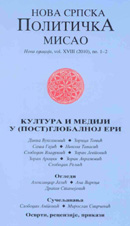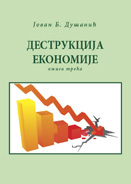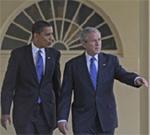| NSPM in English | |||
The Making of George W. Obama |
 |
 |
 |
| петак, 23. јануар 2009. | |
|
Until just a few weeks ago, I was a part of that foreign policy. As Rice’s chief speechwriter and policy advisor, I traveled with her to 24 countries. And I helped write (and rewrite) her remarks—a body of work I’d estimate to be north of 150,000 carefully chosen words. For four years, I watched as a foreign policy took shape that was quite different from that of Bush’s first term. It was a pragmatic internationalism based on enduring national interests and ideals for a country whose global leadership is still indispensable, even as the world is becoming more multipolar. Unfortunately, the election didn’t shed much light on what this inheritance means for Obama. The campaign was a two-year referendum on the Bush presidency in which Obama ran against a caricature of Bush’s first term and John McCain ran desperately away from the whole thing. It was as if the past four years never happened. But because they did, Obama will inherit a foreign policy that is better than many realize. Yes, there will be changes ahead—most likely, to energy and climate change policy (thankfully), to the war in Iraq (winding it down), to the war in Afghanistan (winding it up), and to the detention facility at Guantánamo Bay, Cuba (closing it, which some in the Bush administration tried to do but couldn’t). But despite all that, Obama’s foreign policy likely won’t depart radically from Bush’s. Take the three states Bush once labeled an “axis of evil”—Iran, Iraq, and North Korea. After changing the regime in Baghdad, his administration in the second term fully committed to changing the behavior of Pyongyang and Tehran. As a result, Obama will receive the baton on a multilateral negotiation with North Korea that has been and will be a frustrating marathon, but he will likely pick up where Bush leaves off, simply because there are no practical alternatives. On Iran, Obama will almost surely proceed with Bush’s policy of sticks and carrots that seeks a diplomatic solution—a third option between acquiescing to Iran’s behavior or attacking Iran to change it. To have a better chance of success, this policy will need sharper sticks and sweeter carrots, including the direct engagement Obama has advocated. And if that fails, Obama will have to weigh his options—none of which, he has said, he’s taking off the table. As for Iraq, Obama will inherit a war that Iraqis themselves are mostly ending for him. The pace and size of the U.S. troop reduction may be hotly debated, but few in Baghdad or Washington dispute that such a withdrawal is now appropriate. This effort to end the war in Iraq will enable Obama to try to save the war in Afghanistan, employing many of the lessons learned from the surge strategy he opposed in Iraq. A challenge for Obama will be to knit the Iraq endgame into a broader approach to the Middle East. But here, too, it likely won’t look all that different from Bush’s: support for an independent Lebanon; attempts to elicit responsible behavior from Syria; and security cooperation with Sunni Arab regimes that may not love freedom, but definitely hate what Iran, and al Qaeda, are doing to the region. Another part of this strategy for Obama is continuing Bush’s engagement on the Middle East peace process. A real insight of Bush’s first term had been that the Israeli-Palestinian conflict was more than a border dispute, as Bill Clinton had framed it. Bush argued that peace required a successful Palestinian state and economy. But the first-term policy amounted to telling the Palestinians to put their house in order first, and then the United States would talk about ending the Israeli occupation. Only in the second term were both efforts pursued simultaneously. And because of it, Obama will inherit a Middle East peace process finally proceeding on both tracks at once: state-building and peacemaking. Just as importantly, Obama will find a changing Middle East where freedom, opportunity, and the longing for dignity are bubbling up in ways that no one can control, Washington included. Something tells me that the leader of the Democratic Party isn’t going to give up on supporting democracy, both in terms of institutions and elections. Obama may rebrand Bush’s poorly named “freedom agenda”—he may expand it, as some of his advisors suggest, into a “dignity agenda”—but the basic approach will likely continue. So, too, will there be little change on issues of global grand strategy. A refrain from the campaign was rebuilding damaged ties with America’s allies. But those ties have largely been rebuilt already—in Asia, Europe, and Latin America. Obama can certainly improve these relations further, especially with real action on climate change. But another challenge may be managing the bubbles of overinflated expectations for his presidency that will soon begin bursting in allied capitals. Bush will also bequeath to Obama a realistic strategy for managing the rise of great powers. By pushing China, India, Japan, Brazil, and others to be responsible stakeholders in the international order, the Bush administration showed that “the rise of the rest” need not be synonymous with America’s decline. In fact, it might actually enhance U.S. influence. In Asia, the most geopolitically dynamic part of the world, the United States now has better relations with each major power than they do with one another. Every state wants to hedge against the others, and the partner of choice is Washington. Obama’s task will be to continue inducing these emerging powers to share a greater burden of managing a new set of global challenges that no country, including the United States, can manage alone. The asterisk here is less a rising China (though the question is still open) than a resurgent Russia. And with Russia, too, Obama will inherit a strategy that he’s likely to continue, simply because it’s better than the alternatives. It seeks neither to isolate Russia (which is impossible) nor to give Russia the blank check it wants in its old imperial stomping grounds (which is irresponsible). Rather, this policy seeks to balance cooperation with Russia on many shared interests with competition when interests diverge. Maybe this balance could have been struck better on issues such as Kosovo or missile defense, but that doesn’t signal the need for a new policy, just a recalibration of the current one. And if anything, the Georgia war showed that, if the United States wants Russia to be a responsible stakeholder, encouragement won’t be enough. There will even likely be a great deal of continuity in the fight against al Qaeda. There’s a consensus now that preemption is necessary to fight terrorism; Obama himself has advocated for it. But in Bush’s second term, the administration basically converged on a new mantra: “We can’t kill our way to victory,” a key tenet of counterinsurgency strategy. The focus became not just fighting terrorists but building conditions of security, opportunity, and justice for the societies that terrorists seek to radicalize. It was even accepted that the United States might have to reconcile with some terrorists, as it did in Iraq and as some now support doing in Afghanistan. Obama most likely—and correctly—will not refer to a “war on terror” as the organizing principle of U.S. foreign policy, but that doesn’t mean he won’t approach terrorism in much the same way. Such a strategy depends, as the Bush administration eventually conceded, on embracing nation-building as a national interest. There is now a consensus that the United States is threatened as much by failing and poorly governed states as strong, aggressive ones. Obama’s challenge will be to continue the Bush administration’s effort to make nation-building a civilian-led effort—to demilitarize U.S. foreign policy by trying to prevent states from failing in the first place. This effort will require a transformation of U.S. institutions of “soft power”—a goal that former Secretary of State Colin Powell, then Rice, and most famously Gates made into a personal crusade. Obama will inherit the start of it—an enlarged diplomatic corps, a rudimentary civilian expeditionary force, and foreign assistance that has been increased more than at any time since the Marshall Plan—and he looks poised to carry the torch. The pragmatic internationalism that Bush will pass to Obama was largely defined through changes made during the past four years. And for that reason, there might be more continuity between the second term of Bush and the first term of Obama than between the two terms of Bush himself. This foreign policy is a valuable inheritance. And if Obama avoids spending his early years in office pursuing change for the sake of change—simply trying to disassociate himself from his predecessor, as Clinton and Bush too often did—he could create the makings of a new bipartisan consensus on foreign policy. Obama might realize this, but the Democratic and Republican parties, I fear, will not. They could each pretend as if Bush’s second-term foreign policy never happened. At worst, Democrats could swagger righteously into power, believing their predecessors were rubes who screwed everything up, and now is the chance to do everything differently. For their part, Republicans could tell themselves the comforting lie that they lost because Bush abandoned a real conservative foreign policy—that his second term was all capitulation to the striped-pants appeasers of the State Department. One of my regrets about my work at the State Department is that we were unable to convince the American people that Bush’s pragmatic internationalism had within it the makings of a strong, sustainable global leadership for the 21st century—and that, as such, it had the potential to heal some of the fraught divisions over America’s role in the world that have plagued the country since the end of the Cold War. My hope is that Obama will not only continue this foreign policy, but strengthen it and expand support for it among all Americans. Were he able to do that, it would truly be a change I could believe in. (Christian Brose is a senior editor at Foreign Policy. He served as chief speechwriter and policy advisor for U.S. Secretary of State Condoleezza Rice from 2005 to 2008, and as speechwriter for former U.S. Secretary of State Colin Powell from 2004 to 2005).
|
Од истог аутора
Остали чланци у рубрици
- Playing With Fire in Ukraine
- Kosovo as a res extra commercium and the alchemy of colonization
- The Balkans XX years after NATO aggression: the case of the Republic of Srpska – past, present and future
- Из архиве - Remarks Before the Foreign Affairs Committee of the European Parliament
- Dysfunction in the Balkans - Can the Post-Yugoslav Settlement Survive?
- Serbia’s latest would-be savior is a modernizer, a strongman - or both
- Why the Ukraine Crisis Is the West’s Fault
- The Ghosts of World War I Circle over Ukraine
- Nato's action plan in Ukraine is right out of Dr Strangelove
- Why Yanukovych Said No to Europe

.jpg)








 On December 1, Barack Obama, who won the U.S. presidency as the candidate of “change,” announced his national security team: President George W. Bush’s secretary of defense (Robert Gates), Secretary of State Condoleezza Rice’s special envoy for Middle East security (James Jones), and the doyenne of Democratic centrism (Hillary Clinton). Some saw this as the political cover Obama needs to lead U.S. foreign policy in an entirely different direction after Bush. Perhaps. But I doubt it. My hunch, and my hope, is that Obama will be a successful president, not because he’ll totally change the foreign policy he’ll inherit from Bush, but because he’ll largely continue it.
On December 1, Barack Obama, who won the U.S. presidency as the candidate of “change,” announced his national security team: President George W. Bush’s secretary of defense (Robert Gates), Secretary of State Condoleezza Rice’s special envoy for Middle East security (James Jones), and the doyenne of Democratic centrism (Hillary Clinton). Some saw this as the political cover Obama needs to lead U.S. foreign policy in an entirely different direction after Bush. Perhaps. But I doubt it. My hunch, and my hope, is that Obama will be a successful president, not because he’ll totally change the foreign policy he’ll inherit from Bush, but because he’ll largely continue it.











